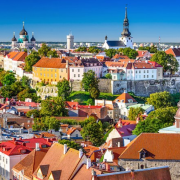Is Estonia Your Office?
Digital nomads are frequently typecast as tech-savvy Millennials remotely working via an Internet connection while living as an expatriate.
However, they come in all shapes and sizes.
The charming Baltic country of Estonia is offering a visa targeted at Non-EU passport holder digital nomads, and other countries will likely copy this progressive type of visa.
Estonia’s revolutionary visa allows digital nomads to work in Estonia all year round.
This visa also includes 90 days of travel in the Schengen Zone of mainland Europe which could be a vital negotiating point in a new era of closed borders and stringent immigration policies.
U.S. citizens are currently banned from entering Europe with no end in sight, thanks to the pitiful handling of the unfortunate health crisis.
This visa origination stems from the Central and Eastern European countries losing their educated youth as they book it out of Latvia, Lithuania, Hungary, and Poland as soon as they first realize that salaries are orders of magnitude higher in Germany.
Estonia has no choice but to pull from Non-EU countries.
More importantly, jacking up the volume of tech workers is becoming an existential issue for many sovereign countries as developed countries reap the monetary rewards from such new cutting-edge technology.
The Baltic nation of Estonia was an architect of tech innovation in the past, rolling out Skype before Facebook and Twitter even existed.
Skype is now owned by Microsoft who acquired them for $8.5 billion in 2011 which is peanuts compared to today’s market valuation.
Skype was entirely comprised of local Estonian developers who achieved this in the early 2000s.
Quite a feat for such a small population.
These digital nomads create communities that harness an enormous flow of tech know-how.
Tallinn, Estonia has erupted into a top 10 digital stronghold attracting hordes of digital nomads.
If technical issues arise, help is on the way!
The message is that simple.
Estonia does not care if you drink kombucha lattes or if you eat green tea ice cream.
Their main concern is if you know how to use a computer well or not - plain and simple.
The global tech talent shortage is a leading issue in many megacities, and this is just the beginning of a world led by digital nomads.
Although the recent wave of Silicon Valley layoffs has offered some slack to the labor market, the onus is on Estonia to convince tech talent to relocate to Tallinn.
The world has moved on from outdated visa policies and Estonia understands it needs to evolve to survive.
Expect more exotic residence visas targeting immigrants who bring value-added computer skills in topics such as machine learning, software engineering, and fintech.
The Estonian government has been bold and is, in some ways, acting with a start-up mentality itself.
This young, audacious government looks to scale up as fast as possible. The visionary policy is seen as the solution to maneuvering around long-lasting social problems.
These pro-growth tech policies could invigorate local youth offering them a lifeline in their own country.
Rebranding itself as the digital nomad epicenter is a risky move that most governments wouldn't dare to do.
It's easy to ignore the brain drain in the Baltics while I am based in the Bay Area.
Silicon Valley has been drawing in the Rolls Royce of tech talent from Estonia for generations.
One of our IT guys is from Estonia himself so I can vouch for the quality there.
How can diminutive Estonia engineer tech growth?
They must learn how to crawl before they can walk.
If this visa experiment gains momentum, it could be a game-changer while nudging the Baltics closer into the developed West’s orbit of influence, reinvigorating the local birth rate, and spurring a rise in income levels.
A win-win situation, but easier said than done.
As for me, I won't be taking a Wizz Air flight to Estonia to work in a coffee shop anytime soon.
I prefer Incline Village, Nevada, and Zermatt, Switzerland, as my go-to digital nomad hideouts.
If it's not broke, don't fix it.



